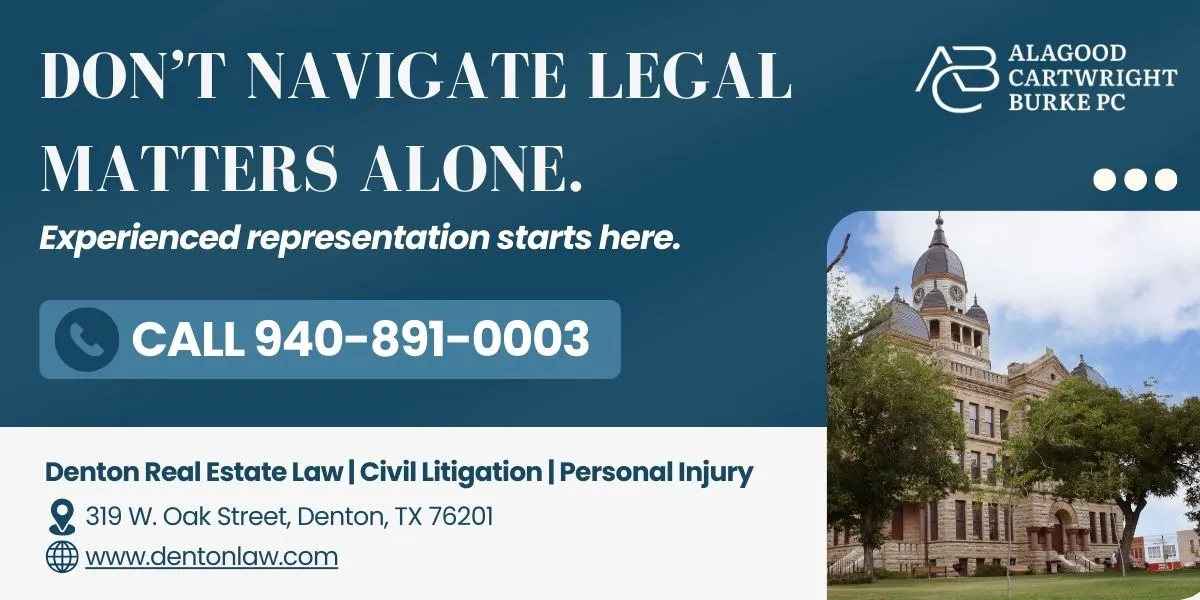Denton Car Accident Lawyer

Denton Car Accident Attorney
Were You Injured In A Motor Vehicle Accident?
Motor vehicle accidents come in all forms, including car wrecks, truck and 18-wheeler accidents, motorcycle accidents, boating accidents, and even airplane crashes.

Regardless of the type of accident you were involved in, one thing is certain if you are reading this: It was a traumatic event that has affected virtually every area of your life. There is probably a good likelihood that you are in pain, are having difficulty sleeping, jump or panic every time you hear a loud sound while riding or driving in a car; or you are worried about how you are going to pay your medical bills, worried about how you are going to feed yourself and your family while you are unable to work, worried about repairing or replacing your car and frustrated with dealing with the defendant’s insurance company, just to name a few.
Dedicated To Helping You
Remember that there is help available. At {%1n}, you can schedule a cost-free consultation with a board-certified Personal Injury Trial Attorney or a board-certified Civil Trial Law Attorney who can evaluate your case and answer many of the questions that you probably have which have caused you anxiety during this uncertain time.
FAQs
What Do I Have To Prove To Recover The Compensation I Deserve For My Injuries?
That depends on what caused your injuries (human error versus mechanical error); who might be liable for your injuries (e.g., the operator of the motor vehicle, the operator’s employer, the vehicle’s owner or a common carrier); and what potential claims you are able to assert based upon the facts of your case.
While a discussion of all of the different claims potentially available to you is too great to tackle in this short post, you can allege that the defendant’s negligence caused your injuries. Negligence is generally defined as failing to do or not do that what a reasonably prudent person would do under the same or similar circumstances. In an auto accident case, this is simply a fancy way of saying that you were injured because the other driver did not drive safely.
If I Win, What Damages Am I Entitled To Recover?
If you establish that the defendant is liable to you, you may be entitled to recover a variety of damages, depending on the facts of your case. These damages include, but are not limited to:
- Past and future medical expenses, including mileage to and from doctor’s appointments
- Past and future lost wages
- Loss of earning capacity
- Past and future mental anguish
- Past and future physical pain and suffering
- Past and future physical impairment
- Disfigurement
- Punitive damages
- Prejudgment and post-judgment interest
- Court costs
Importantly, the defendant is not required to pay damages for injuries that you sustained prior to the accident or wreck that you are currently complaining about. Therefore, the defendant will go to great lengths to prove all, or at least a substantial part, of the damages that you are claiming is not their responsibility because you suffered from a preexisting medical condition. While you may have suffered from a preexisting condition, you should note that a defendant can be held liable to pay for any damages suffered by you if their conduct aggravated your preexisting condition.
Will The Defendant Try To Blame Me For The Accident Or My Injuries?
Yes. If you have already been dealing with the defendant’s insurance company, the adjuster may have tried to blame you or someone else for the accident or some prior medical condition for the injuries that you suffered. This is probably not going to stop. Because defendants, their insurance companies and their lawyers almost always want to deflect blame, the jury will typically be asked not only to determine if the defendant was negligent but also to determine if you or someone else was negligent as well.
If the jury finds that you or someone else was also negligent and caused or contributed to the collision and/or your injuries, then the jury will then be asked to assign the percentage of responsibility attributable to each negligent party. For example, the jury may find that the defendant was 90% responsible, you were 5% responsible and the third party was 5% negligent. The percentage of responsibility assigned to all of the negligent parties must total 100%.
Why Is The Defendant Trying To Blame Me And Asking The Jury To Assign A Percentage Of The Blame To Me?
There are multiple reasons, none of which benefit you. First, if the case just involves just you and one defendant, and the jury finds you 51% or more responsible, then you lose the case.
Second. If the case involves just you and one defendant, and the jury finds that you are 50% or less responsible, then you win, but your damages are reduced by the percentage of responsibility that the jury assigns to you. If the percentage assigned to you is 0%, then you are safe. You get all of your damages because you are found to be blameless. However, if the jury assigns 1%-50% of responsibility to you, the damages that the defendant has to pay you are reduced by that amount. For example, suppose you were awarded $100.00 in damages, but the jury found you 40% responsible. You don’t get to recover the full $100.00.
Instead, your $100.00 would be reduced by your 40% leaving you only $60.00 that the defendant has to pay. The math looks like this: $100.00 minus [$100.00 x your 40% or .4 = $40.00]= $60.00. With a $100.00 award, this reduction probably doesn’t affect you that much, but when your award gets into five figures (e.g., $10,000.00), six figures (e.g., $100,000.00) or worse seven figures (e.g., $1,000,000.00), the savings to the defendant, and why they strive so hard to blame someone else, becomes readily apparent. Indeed, with a 40% assignment of blame to you, the defendant would save $4,000.00 with a $10,000.00 award, $40,000.00 with a $100,000.00 award and $400,000.00 with a $1,000,000.00 award.
Third. If the case involves you and two or more defendants, and the jury finds that all of you are negligent, the same rules will apply as set forth above in the preceding paragraph (i.e., if you are found 51% or more responsible, you lose; but if you are found 50% or less responsible, you win, but your damages will be reduced by the percentage of responsibility assigned to you). Here is the twist, however: how much percentage of responsibility assigned to each defendant will determine how much each defendant has to pay you.
What does this mean? Typically, a defendant should only have to pay the amount of money that they owe you. This means they should only have to pay their percentage of the award that was made to you. For example, if you are awarded $100.00 and the jury finds that a defendant was only 50% responsible for the accident and/or your injuries, then they should only have to pay 50% of the $100.00, or $50.00. Sounds fair, right?
Texas law, however, provides an exception in a case involving multiple defendants: If one of the defendants is found to be 51% or more responsible, then Texas law allows you to make that defendant pay all of the damages you are entitled to recover (i.e., damages awarded less your percentage of responsibility). If the defendant pays you the entire amount owed to you, that defendant can go after the other defendants to pay their share of the judgment, but that is the problem of the defendant who had to pay and has nothing to do with you. So why is all of this so important to the defendants (and ultimately you)?
It really is most important for the defendants who have money when they are involved in a lawsuit with other defendants who have no money. As you can quickly see, the defendant with money wants to do everything they can to make sure you cannot require them to pay the entire judgment because even if the paying defendant has the right to go after the other defendants to pay their share of the judgment, this right means nothing if the other defendants have no money.
The old adage you can’t squeeze blood from a turnip comes to mind. Therefore, the defendant with money will try particularly hard to make sure he or she is found to be less than 51% responsible (i.e., 0%-50%) so they are not stuck “holding the bag” and paying the entire judgment with no viable way to get the other defendant(s) to pay their fair share.
Should I Contact A Personal Injury Attorney?
Yes. Most people who come to our law firm have never been involved in a motor vehicle accident and have no idea what to do. As a result, they should arm themselves with as much information as they can to help avoid many of the traps and pitfalls that lay in front of them.
For example, the defendant’s insurance company will often request that you provide a recorded statement. The purpose of the call is supposed to find out what happened and assess the case against their insured.
Unfortunately, some adjusters may use the call as an opportunity to trick you into saying something that you did not intend, including saying that the accident was your fault in its entirety or at least partially (thereby reducing or extinguishing their insured’s liability as explained above), and/or that you are not hurt.
While there are some adjusters who are simply looking for the truth, you need to remember that they represent the insurance company. If they try to tell you that they are just there to help, chances are they are not. If you have not yet given a statement, it is typically better to have a consultation with a qualified attorney beforehand. Remember, information is power so get as much as you can.
What Should I Bring With Me During My Cost-Free Consultation?
It is typically helpful to bring as much as you have. If you have them, bring these four documents:
- The police accident report
- Photographs (of the vehicles involved, the accident scene and your injuries)
- Medical bills
- The declarations page of Your Auto Policy (This is the page that states the amount of coverage that you have. This is needed to determine if you have access to money under your policy that will assist you with out-of-pocket expenses and/or medical bills while you are waiting for the defendant and their carrier to pay your claim, or to determine if there are additional amounts owed either because the defendant was uninsured or underinsured).
Schedule A Free Consultation Today
Brian T. Cartwright certified by the Texas Board of Legal Specialization in Personal Injury Trial Law and Samuel B. Burke certified by the Texas Board of Legal Specialization in Civil Trial Law stand ready to answer your questions and help you through this difficult and trying time of your life.
Give Sam or Brian a call at 940-891-0003 for a cost-free consultation to help you determine what your rights and responsibilities are. You may also contact our personal injury attorneys online.


